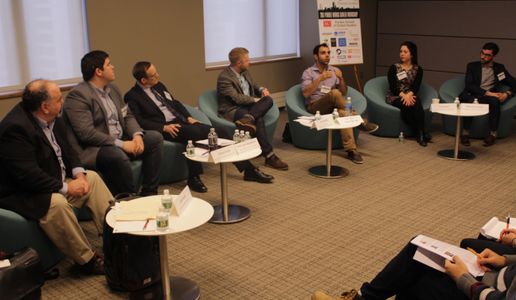Pardee School Hosts 2017 Pardee Works Career Workshop
The Frederick S. Pardee School of Global Studies at Boston University 2017 Pardee Works Career Workshop was held on March 24, 2017 and provided students with an afternoon of development and networking with professionals currently working in the diverse field of global studies.
The workshop was comprised of two panels with concurrent presentations on a range of topics including how to conduct an effective job search, how to use social media to your advantage in finding a job and how to navigate the transition from college to career. Following the panels and presentations students had the opportunity to network with panelist and presenters.
The first panel of the workshop, entitled “Insights From Recruiting Experts,” was moderated by Pardee School Professor of the Practice of International Relations Amb. Robert Loftis and included Mike Bruni, Director of Recruiting at SC3; Chris Chernicki, Manager of Global Team Management at Amazon; Meredith Millord, People Operations Manager at MASS Design; Katie Remy, Development Associate at MamaHope; Donna Yergeau, Director of Legal Recruiting at Nutter McLennen Fish, LLP; and Rachael Weisz, Human Resources Director at Partners in Health.
Weisz told students to not be discouraged if they don’t necessarily meet every qualification of a job posting, and that intangibles like attention to detail and perseverance are often just as important to recruiters as an impressive resume.
“Your job as a candidate is to help me see that you have the skills to work for me,” Weisz said. “You may not have the knowledge yet, you’re going to need to learn about fundraising if that’s what you want to do, but if you’re smart you can learn that. What can’t learn is the ‘go-get-em’ mentality, the attention to detail and the perseverance.”
Remy encouraged Pardee School students to pursue informational interviews as a way to learn more about an organization they’d like to work for.
“If you’re not sure where you fit in within a specific organization, or you’re not sure if this is the path you want to take, go on an informational interview,” Remy said. “Through those conversations you’ll get better at telling your storyand you’ll get better at talking about the industry.”
In his presentation, entitled “The Highly Effective Job Search,” author and career coach Orville Pierson said that networking is often a more effective approach in finding a job than passive approaches like cold-calling.
“If you are going to the employer before they have a job opening you’re in a much better position because there’s a much smaller group of people they are aware of,” Pierson said. “It’s not uncommon for them to simply hire one of those people before the job even gets posted publicly. That’s why more jobs are found through networking than approaches that are more reactive and passive.”
Following the first panel, Bruni delivered a presentation entitled “How Social Media Can Help or Hinder the Job Hunt,” and discussed his 18 years of experience in talent acquisition, human resources, sourcing and national security. He told students who are about the graduate and enter the job market not to get discouraged if they don’t immediately have success finding a job. He stressed that a job search is a process that rarely involves instant success.
“Don’t assume it’s going to an easy process. It never is,” Bruni said. Even if you’re getting interview after interview, offer after offer. You’re walking into a job, you’re not necessarily walking into a career.”
The second panel of the afternoon, entitled “Navigating the Transition From College to Career,” was moderated by Pardee School Professor of the Practice of International Relations John D. Woodward Jr., and included Jim Ansara, Founder and CEO of Build Health International and Shawmut Construction; William Kring, Assistant Director of the Global Economic Governance Initiative; Susi Neher (Pardee ’16), U.S. Operations Associate for Gardens for Health; Michael Pizzifieri, Public Affairs Attache at the Quebec Government Office; Jon Shaffer, Executive Director of the Boston Network for International Development; and Omar Shakir, Israel and Palestine Director at Human Rights Watch.
“Find out what you’re passionate about and what you really want to work on. If you get that out of your college experience, or if you don’t have that by the end of college, think about experiences right after college that will allow you to figure that out,” Shakir said. “Once that’s clear everything else becomes much easier. It’s an internal process about learning who you are, what your strengths are and what your theory of change is. You’re much better able to do that if you know what you’re overarching vision is.”
Pizzifieri encouraged students to use their college experiences to their advantage when applying for jobs, and to practice conveying their story so that they can articulate how those experiences are relevant to a potential employer during a job interview.
“You’re just graduating, but that doesn’t mean you don’t already have valuable experiences. What I mean by that that you need to know your own story incredibly well,” Pizzifieri said. “Whether that is your work-study, a summer internship or even a volunteer experience, you really never know how that might fit into later conversations you’re having when applying for a job.”





